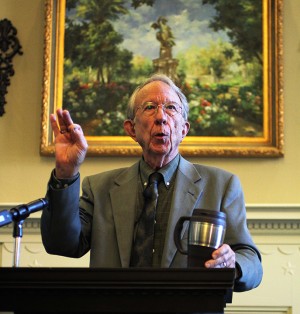
Travis Taylor | Lariat Photo Editor
Reporter
Christians should not be tame but good, said Dr. Ralph Wood, professor of theology and literature.
Tuesday at the fourth annual Drumwright Family Lecture, the Alexander reading room was full as faculty, staff and students came to hear Wood speak.
Wood has studied the works and life of C.S. Lewis for a vast majority of his life, and he said he came to the conclusion that Christians are called to be good but not tame through theosis. Theosis is the idea that people are here on this earth to be a part of God’s bigger plan.
“C.S. Lewis has influenced more thoughtful people than anyone else in the late 19th and early 20th century,” Wood said.
He said he thought Lewis best summarized theosis in his written works, in the idea that Christians live to a higher calling and that is why Christians must be good but not tame.
“The whole idea revolves around the idea that God defines goodness, not ourselves,” Wood said. “We can’t be tame by the world’s standards if we are to be good by God’s standard and likewise we can’t be good by the world’s standards if we are bold.”
Wood said he picked the title for his lecture from one of Lewis’s most famous works, “The Chronicles of Narnia: The Lion, the Witch and the Wardrobe.”
“I formed my idea about what it meant to be tame but not good directly from one of the characters in the book, Mr. Beaver,” Wood said. “Mr. Beaver, when referring to Aslan, the God of Narnia, a lion, says, ‘Of course he isn’t safe. He is wild after all, but he is good.’”
Wood said he originally wanted to title his lecture “Why Christians Should Be Good and Wild” but that he was afraid students would take it the wrong way.
“It is so important to understand theosis because what we see shapes our souls, and I think God meant all of us to be a bit wild in regards to how we follow him,” Wood said.
Wood lectured about how theosis shaped his life growing up in the back woods of East Texas during a time when segregation was normal.
“Looking at Scripture, I didn’t understand why, if all men are equal to God, a black man could not sit next to me on the bus,” Wood said.
Wood said he wrestled with the idea of segregation and came to the idea that treating everyone equally in that time was a wild idea and that it was theosis.
“If you want to see how theosis occurs in someone’s life, look to C.S. Lewis as an example,” Wood said. “It is all about being wild in the right ways.”
Houston junior Claire Roberts said she thought Wood’s lecture raised good points.
“We go to a Christian university,” she said. “When we graduate and go out into the real world, we need to remember to be wild for God and reflect Him in our lives.”
Wood also pointed out that most of the evil in the world comes from misguided intentions.
“Most evil in this world is committed in the name of some kind of love,” Wood said. “This is why evil is such a powerful force. It shapes us in his image and makes us believe we are doing the right thing.”
Wood said it is important at Baylor to remember how evil traps people because everyone can fall under the impressions that they are doing God’s will in their lives when they really are not.
“Theosis can go both ways,” Wood said. “Our lives are either more or less like the image of God, so we must be careful how we practice what we claim to believe.”
Roberts said Wood’s lecture was powerful. “He truly made me think about how we, as Christians, need to stop hiding behind false images of what the world sees as good and start acting in accordance to what God sees as good and not be shy about it,” Roberts said.
Wood said he wanted to give the lecture in honor of the 50th anniversary of C.S. Lewis’ death and to encourage students to be wild in all the right ways.



